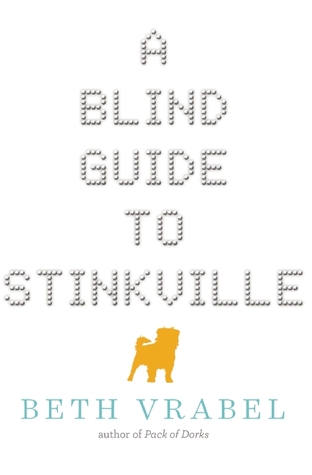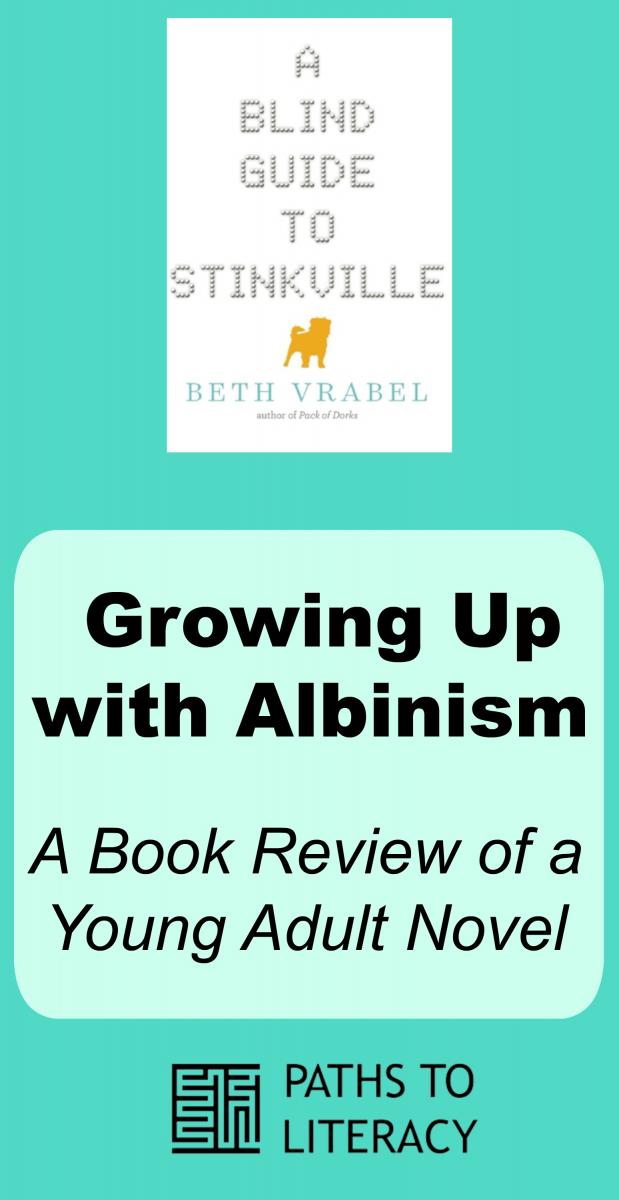A Blind Guide to Stinkville
By: Beth Vrabel
Young adult fiction has always been one of my favorite genres of literature. I am captivated by author’s abilities to connect with adolescents through the pages of a story, and when the opportunity to read a book where the main character had albinism arose, I was eager to get started. After downloading “A Blind Guide to Stinkville” by Beth Vrabel to my iDevice, I immediately began scrolling through the pages. I found that I could not stop reading, and I couldn’t read fast enough to keep up with my desire to find out what happened next in the story. At times, I made myself stop and close my eyes for a second to savor the story because as I read chapter after chapter, I knew the end was nearing, and I could already tell that once the book was over, I’d experience that feeling of wanting more, like when you have that last bite of ice cream on a hot day. “A Blind Guide to Stinkville” follows Alice, a 12-year-old girl with albinism, as she tries to make the stinky paper mill town of Sinkville South Carolina feel more like a home.
For Alice, life had been great right up until her family moved from their happy home in Seattle Washington to a small mill town called Sinkville in South Carolina. Everyone back home knew about Alice and her albinism. She used a magnifier to read books, wore sunscreen and hats, and occasionally used her cane to avoid bumping into things in new environments. Leaving her life and best friend behind was bad enough, but moving to a small paper mill town that smelled bad enough to be dubbed “Stinkville” by the residents made life much more difficult for Alice. What made things worse for was that she didn’t know anyone and couldn’t get around on her own causing her parents to look into schools for the blind. With her mom battling depression, her father immersed into a new job, and her brother dealing with his own feelings about the move, Alice becomes determined to show her family that she is independent and capable and can face her visual impairment head on!
At the library, where Alice ventures each day to take refuge from her home, she learns about the Sinkville Success Stories essay contest. Although no one thinks that the “new girl” could possibly find out all of the juicy stories in the town, Alice immerses herself into the task while making many friends along the way. Throughout her journey, Alice gains confidence and empowerment as she faces adversity in a new place while trying to cling to her old life and keep her family from tearing apart at the seams.
Having moved to a new town at the start of high school, I could definitely identify with Alice’s feelings. As I clung to my old friends, they embraced new opportunities and seemed to move on without me. I was put into a new environment where I had to learn to advocate for myself all over again, and while this wasn’t so difficult in the academic sense, advocating and explaining in the social sense was extremely difficult. The author handled this delicate situation quite beautifully in the way she documented common perceptions and misconceptions about those with visual impairments and in the language she gave Alice to communicate about her needs both to the audience, and to the other characters in the book. I found the analogies and descriptions of visual abilities to be realistic and believable in most instances.
Beth Vrabel tackled so many topics within the pages of this book. Depression, learning disabilities, and visual impairment were just a few. The lives of the characters were so intertwined and complex that at times, I almost forgot that the main character had albinism. This struck me as very profound in that I believe this book speaks to a variety of audiences and is valuable to those in and out of the albinism community. “A Blind Guide to Stinkville” is definitely a “coming of age” story. Each character, no matter the role grows and develops their sense of accepting change as the story progressed. If you’re looking for a great summer read, I highly recommend this book. I’m looking forward to the sequel!


